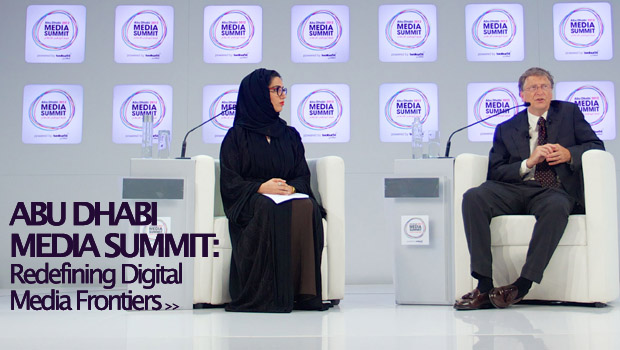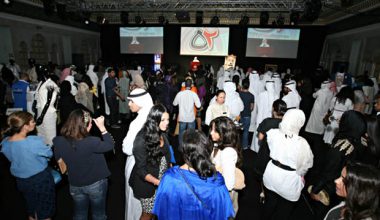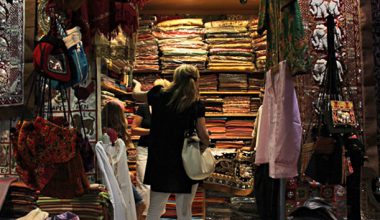
On Tuesday October 9, 2012, the world's top media and technology leaders gathered at the Yas Viceroy Hotel in Abu Dhabi, UAE, to launch the Abu Dhabi Media Summit 2012 which was held under the patronage of HH General Sheikh Mohamed Bin Zayed Al Nahyan, Crown Prince of Abu Dhabi and Deputy Supreme Commander of the UAE Armed Forces.
The three day event, under the theme of ‘Redefining the Digital Frontier,’ was officially opened by H.E Khaldoon Khalifa Al Mubarak, Chairman of the Abu Dhabi Media Summit and Chairman of the Executive Affairs Authority.

The summit's honorary speaker, Bill Gates, Chairman of Microsoft and philanthropist, took to the main stage to deliver his keynote address, entitled ‘Philanthropy, Technology, and the Gulf’s Humanitarian Opportunity’. Gates discussed the role of philanthropy through new media, and how the Gulf region, a quick adapter of new technology, can use its resources to help reduce poverty and disease worldwide.
Among the 400+ international attendees from various media outlets were CEOs of media production houses and global media and digital leaders like Google, Warner Brothers, CAA, Viacom International, Fox International, Twitter, Pinewood Shepperton and Ridley Scott Associates.
Throughout the summit, the attendees discussed key trends in technology and media that are shaping the world, identified and analyzed these trends, and shared personal experiences. Some key topics were the future of youth television, and digital and social media.
DAY 2
Mark Gerhard, CEO of Jagex, talked about the development of browser gaming, predicting that sooner or later makers of platforms such as Xbox, Playstation and Wii will have to “liberate their consoles and make them more accessible to the browser,” adding that they already have a presence in the Gulf but that they "have to come up with something that works culturally in the right regions and I think the opportunity will be with sci-fi games.”

Nart Bouran, Head of Sky News Arabia, Greg Beitchman, Global Head of Multimedia for Thomson Reuters, Yousef Gamal El Din, Middle East Correspondent for CNBC, and Bill Spindle, Middle East Bureau Chief for the Wall Street Journal, discussed news reporting in the digital world.
Booz & Company’s Karim Sabbagh, Global Leader for the Communications, Media and Technology Practice, talked about the Arab Digital Generation (ADG) and the findings in a global new report sponsored by Google. Among the findings were that 83% of this new Arab generation use the Internet daily; 40% watch short videos online for entertainment daily; and 80% would give up their TV in favor of the Internet if they were forced to choose; Four out of five ADG’ers do not engage in any transaction activity online.
Melvin Ming, President and CEO of Sesame Workshop, gave a speech entitled Learning Curves, via a live satellite link from New York. He discussed the future of pre-school education, the role of media in education, and how Sesame Street educates pre-school children. Sesame Workshop’s VP International Robert Knezevic said that there were plans to launch a new Arabic language Sesame Street in the Gulf soon.
HRH Princess Rym Ali of Jordan, in a discussion entitled Youthquake talked about the importance of digital literacy in the Middle East, and how it can be used to develop and understand the issue of freedom of expression in the region and to have a more open positive society.
DAY 3

Founder and CEO of Aramex, Fadi Ghandour, stressed the need to support entrepreneurs in the UAE, saying, “If we are talking about national wellbeing, we are talking about jobs and the power of entrepreneurship to create new wealth. And the concept of dignity we hear about in the Arab Spring is about having a good job, about independence of earning power and income, it gives the feeling of a sense of empowerment.”
In the Arab world, 26% of the youth want to start their own businesses, compared to just 4% of the youth in the US, but according to Ghandour, the education system is not supporting them.
Antonio Campo Dall’Orto, of Viacom International Media Networks, highlighted findings from a report on the Millennial Generation and Youth in the Middle East including the fact that there are 2.4 billion Millennials (born 1981-2001) in the world today, accounting for 34% of the total population, and said their spending power is pushing $1 trillion.
Mohammad Gawdat, VP of Emerging Markets for Google, said “Everyone says it’s easy for Google to be innovative but what about banks, telcos etc. My answer is there are several models of innovative and no one has an excuse not to be innovative.The reality is everyone is born innovative we just suppress it. It has nothing to do with how many dollars you spend … very often it just takes passion and an idea.”
A session entitled “New Waves,” took a look at booming online businesses in the Middle East through a series of presentations. Abed Agha, Founder of Vinelab, talked about his company’s mobile apps. His company, which builds apps for entertainment and media businesses, has more than 3.5 million users in the region.
Ayham Gorani, CEO of AlphaApps, talked about an iPad app, available in Arabic and English, he is creating for children in the region. The app, which is expected to launch by the end of 2012, involved children in every stage of the app's research and development process.
Ihsan Jawad, founder of Zawya, said, “Innovation is a trial and error process. Failure is inevitable. Failure is necessary sometimes… If you want to be an innovator you have to fail fast and learn from some of your failures.”
– Sam Khoury
Photos: Karl Jeffs/Gecko Media













































